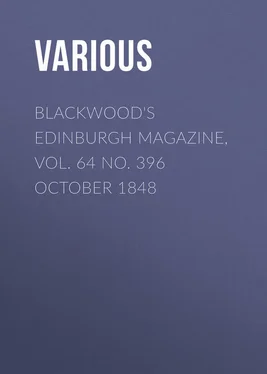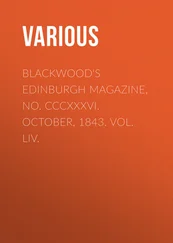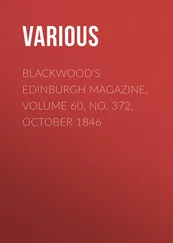Various - Blackwood's Edinburgh Magazine, Vol. 64 No. 396 October 1848
Здесь есть возможность читать онлайн «Various - Blackwood's Edinburgh Magazine, Vol. 64 No. 396 October 1848» — ознакомительный отрывок электронной книги совершенно бесплатно, а после прочтения отрывка купить полную версию. В некоторых случаях можно слушать аудио, скачать через торрент в формате fb2 и присутствует краткое содержание. Издательство: Иностранный паблик, Жанр: periodic, foreign_edu, Путешествия и география, на английском языке. Описание произведения, (предисловие) а так же отзывы посетителей доступны на портале библиотеки ЛибКат.
- Название:Blackwood's Edinburgh Magazine, Vol. 64 No. 396 October 1848
- Автор:
- Издательство:Иностранный паблик
- Жанр:
- Год:неизвестен
- ISBN:нет данных
- Рейтинг книги:4 / 5. Голосов: 1
-
Избранное:Добавить в избранное
- Отзывы:
-
Ваша оценка:
- 80
- 1
- 2
- 3
- 4
- 5
Blackwood's Edinburgh Magazine, Vol. 64 No. 396 October 1848: краткое содержание, описание и аннотация
Предлагаем к чтению аннотацию, описание, краткое содержание или предисловие (зависит от того, что написал сам автор книги «Blackwood's Edinburgh Magazine, Vol. 64 No. 396 October 1848»). Если вы не нашли необходимую информацию о книге — напишите в комментариях, мы постараемся отыскать её.
Blackwood's Edinburgh Magazine, Vol. 64 No. 396 October 1848 — читать онлайн ознакомительный отрывок
Ниже представлен текст книги, разбитый по страницам. Система сохранения места последней прочитанной страницы, позволяет с удобством читать онлайн бесплатно книгу «Blackwood's Edinburgh Magazine, Vol. 64 No. 396 October 1848», без необходимости каждый раз заново искать на чём Вы остановились. Поставьте закладку, и сможете в любой момент перейти на страницу, на которой закончили чтение.
Интервал:
Закладка:
Fanny, indeed, perplexed me horribly. Sometimes I fancied she liked me; but the fancy scarce thrilled me with delight before it vanished in the frost of a careless look, or the cold beam of a sarcastic laugh. Spoiled darling of the world as she was, she seemed so innocent in her exuberant happiness, that one forgot all her faults in that atmosphere of joy which she diffused around her. And despite her pretty insolence, she had so kind a woman's heart below the surface! When she once saw that she had pained you, she was so soft, so winning, so humble, till she had healed the wound. But then , if she saw she had pleased you too much, the little witch was never easy till she had plagued you again. As heiress to so rich a father, or rather, perhaps, mother, (for the fortune came from Lady Ellinor,) she was naturally surrounded with admirers not wholly disinterested. She did right to plague them – but ME! Poor boy that I was, why should I seem more disinterested than others! how should she perceive all that lay hid in my young deep heart? Was I not in all worldly pretensions the least worthy of her suitors, and might I not seem, therefore, the most mercenary? I who never thought of her fortune, or, if that thought did come across me, it was to make me start and turn pale! And then it vanished at her first glance, as a ghost from the dawn. How hard it is to convince youth, that sees all the world of the future before it, and covers that future with golden palaces, of the inequalities of life! In my fantastic and sublime romance, I looked out into that Great Beyond, saw myself orator, statesman, minister, ambassador – Heaven knows what; laying laurels, which I mistook for rent-rolls, at Fanny's feet.
Whatever Fanny might have discovered as to the state of my heart, it seemed an abyss not worth prying into by either Trevanion or Lady Ellinor. The first, indeed, as may be supposed, was too busy to think of such trifles. And Lady Ellinor treated me as a mere boy – almost like a boy of her own, she was so kind to me. But she did not notice much the things that lay immediately around her. In brilliant conversation with poets, wits, and statesmen – in sympathy with the toils of her husband – or proud schemes for his aggrandisement, Lady Ellinor lived a life of excitement. Those large eager shining eyes of hers, bright with some feverish discontent, looked far abroad as if for new worlds to conquer – the world at her feet escaped from her vision. She loved her daughter, she was proud of her, trusted in her with a superb repose – she did not watch over her. Lady Ellinor stood alone on a mountain, and amidst a cloud.
CHAPTER XXVII
One day the Trevanions had all gone into the country, on a visit to a retired minister, distantly related to Lady Ellinor, and who was one of the few persons Trevanion himself condescended to consult. I had almost a holiday. I went to call on Sir Sedley Beaudesert. I had always longed to sound him on one subject, and had never dared. This time I resolved to pluck up courage.
"Ah, my young friend!" said he, rising from the contemplation of a villanous picture by a young artist, which he had just benevolently purchased, "I was thinking of you this morning – Wait a moment, Summers, (this to the valet.) Be so good as to take this picture, let it be packed up, and go down into the country. It is a sort of picture," he added, turning to me, "that requires a large house. I have an old gallery with little casements that let in no light. It is astonishing how convenient I have found it!" As soon as the picture was gone, Sir Sedley drew a long breath as if relieved; and resumed more gaily —
"Yes, I was thinking of you; and if you will forgive any interference in your affairs – from your father's old friend – I should be greatly honoured by your permission to ask Trevanion what he supposes is to be the ultimate benefit of the horrible labours he inflicts upon you – "
"But, my dear Sir Sedley, I like the labours; I am perfectly contented – "
"Not to remain always secretary to one who, if there were no business to be done among men, would set about teaching the ants to build hills upon better architectural principles! My dear sir, Trevanion is an awful man, a stupendous man, one catches fatigue if one is in the same room with him three minutes! At your age, an age that ought to be so happy," continued Sir Sedley, with a compassion perfectly angelic, "it is sad to see so little enjoyment!"
"But, Sir Sedley, I assure you that you are mistaken. I thoroughly enjoy myself; and have I not heard even you confess that one may be idle and not happy?"
"I did not confess that till I was on the wrong side of forty," said Sir Sedley, with a slight shade on his brow.
"Nobody would ever think you were on the wrong side of forty!" said I with artful flattery, winding into my subject. "Miss Trevanion for instance – "
I paused – Sir Sedley, looked hard at me, from his bright dark-blue eyes. "Well, Miss Trevanion for instance? – "
"Miss Trevanion, who has all the best-looking fellows in London round her, evidently prefers you to any of them." I said this with a great gulp. I was obstinately bent on plumbing the depth of my own fears.
Sir Sedley rose; he laid his hand kindly on mine and said, "Do not let Fanny Trevanion torment you even more than her father does! – "
"I don't understand you, Sir Sedley!"
"But if I understand you, that is more to the purpose. A girl like Miss Trevanion is cruel till she discovers she has a heart. It is not safe to risk one's own with any woman till she has ceased to be a coquette. My dear young friend, if you took life less in earnest, I should spare you the pain of these hints. Some men sow flowers, some plant trees – you are planting a tree under which you will soon find that no flower will grow. Well and good, if the tree could last to bear fruit and give shade; but beware lest you have to tear it up one day or other, for then – what then? why, you will find your whole life plucked away with its roots!"
Sir Sedley said these last words with so serious an emphasis, that I was startled from the confusion I had felt at the former part of his address. He paused long, tapped his snuff-box, inhaled a pinch slowly, and continued with his more accustomed sprightliness.
"Go as much as you can into the world – again I say 'enjoy yourself.' And again I ask, what is all this labour to do for you? On some men, far less eminent than Trevanion, it would impose a duty to aid you in a practical career, to secure you a public employment – not so on him. He would not mortgage an inch of his independence by asking a favour from a minister. He so thinks occupation the delight of life, that he occupies you out of pure affection. He does not trouble his head about your future. He supposes your father will provide for that , and does not consider that meanwhile your work leads to nothing! Think over all this. I have now bored you enough."
I was bewildered – I was dumb: these practical men of the world, how they take us by surprise! Here had I come to sound Sir Sedley, and here was I plumbed, gauged, measured, turned inside out, without having got an inch beyond the surface of that smiling, debonnair , unruffled ease. Yet with his invariable delicacy, in spite of all this horrible frankness, Sir Sedley had not said a word to wound what he might think the more sensitive part of my amour propre – not a word as to the inadequacy of my pretensions to think seriously of Fanny Trevanion. Had we been the Celadon and Chloé of a country village, he could not have regarded us as more equal, so far as the world went. And for the rest, he rather insinuated that poor Fanny, the great heiress, was not worthy of me, than that I was not worthy of Fanny.
Читать дальшеИнтервал:
Закладка:
Похожие книги на «Blackwood's Edinburgh Magazine, Vol. 64 No. 396 October 1848»
Представляем Вашему вниманию похожие книги на «Blackwood's Edinburgh Magazine, Vol. 64 No. 396 October 1848» списком для выбора. Мы отобрали схожую по названию и смыслу литературу в надежде предоставить читателям больше вариантов отыскать новые, интересные, ещё непрочитанные произведения.
Обсуждение, отзывы о книге «Blackwood's Edinburgh Magazine, Vol. 64 No. 396 October 1848» и просто собственные мнения читателей. Оставьте ваши комментарии, напишите, что Вы думаете о произведении, его смысле или главных героях. Укажите что конкретно понравилось, а что нет, и почему Вы так считаете.












